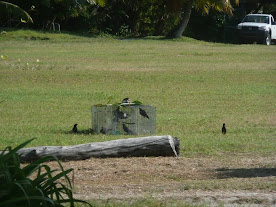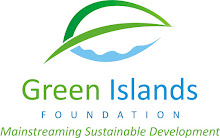On the 25th of June 20 Magpie robins were flown to Denis on a chartered Twin Otter. (see blog entry of Friday 4th July 2008). The introduction technique being utilised is termed a “soft release” the magpie robins were caught on their source islands and kept in captivity for several days under expert care to ensure that their weight and general state of health were stable.
On arrival at Denis the birds were promptly transferred to five two-compartment aviaries strategically positioned throughout the island’s broadleaved forest. The birds were kept in their previously established pairings and stabilisation of their conditions commenced.
The translocation is a highly stressful event for the birds, being caught and placed in small transfer boxes and then boated and/or flown to Denis for release into aviaries. Despite this the birds appeared to be in remarkably good condition on their release into the aviaries.
Captive management care commenced immediately with the birds being provided with a special food mix, water and live food (consisting of cockroaches, larvae etc…) captured on the island.
The birds will be kept in captivity for 2 to 3 weeks whilst their condition is stabilised before they are released by pairs on a staggered schedule.
Whilst in captivity the birds are being cared for by Spencer Collins a captive management expert from Durrell Institute based at Jersey Zoo and Catherina Onezia the Environmental Officer of the Green Islands Foundation. The birds are fed three times a day.
A special food mix is prepared, at 06:00 hrs each morning, consisting of special bird feed, Avimix vitamin supplement, grated carrot and papaya, grated boiled eggs and bread crumbs. All the bowls and preparation tools (knives, forks, graters etc…) are thoroughly sterilised each day using “Virkon S” tablets for the safe and effective control of viruses, bacteria, fungi, yeast and moulds.
This food is provided 3 times a day and live insect and larvae are also given once a day along with a fresh supply of water.
The working hours of Catherina and Spencer are very demanding, each feeding session takes approximately 2 hours because of the geographical layout of the aviaries and the walking entailed. This coupled with food preparation, the gathering of live food from the forest and the general observation of the birds means a long day. Once the birds are released this workload will increase considerably as the birds will likely roam throughout the island before selecting and establishing their territories. Catherina and Spencer will attempt to locate every bird as much as possible because the process of supplementary feeding will continue utilising bird tables which the birds have become habituated to whilst in captivity.
The birds are adapting well so far with only one bird – a sub-adult female - giving rise to concern as she does not seem to be gaining weight since arrival on the island.
Check back to this site for further updates on the magpie robin project.
Subscribe to:
Post Comments (Atom)

























No comments:
Post a Comment